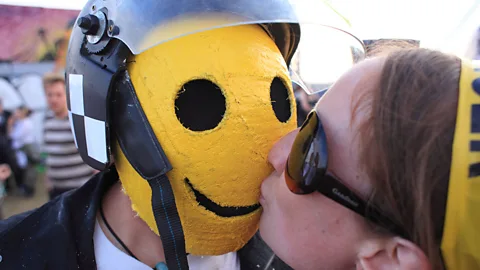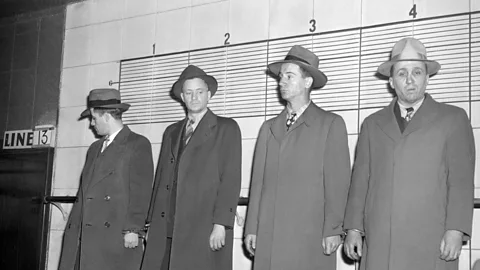Six reasons your memory is stranger than you think
 Getty Images
Getty ImagesThe fallibility of the human memory is well known to psychologists, yet many of us consistently underestimate its capacity to deceive. Read BBC Future’s round-up of its oddest quirks.
1) It is impossible to recall your first few years… but many believe they can
“I presume that my readers do not at all remember, or remember only very vaguely, that highly important period of their existence which anteceded their birth and which transpired in their mother’s womb,” wrote Salvador Dali in his memoir. “But I, yes, I remember this period, as though it were only yesterday.” He hoped that his own recollections of that “divine paradise” would help others retrieve those lost moments of life before birth.
In reality, Dali’s recollections were almost certainly the result of his considerable imagination. Scientists today believe that it is impossible to recall the first few years of life – and the time before birth must also be a complete blank. Many of the necessary brain structures for memory have not yet matured at the time, meaning that it is physiologically impossible for it to retain personal events from early infancy into adulthood. Instead, any recollections of that time are illusory or “false memories” – patched together from other experiences or knowledge that we acquired later in life.
Watch the video below to hear Julia Shaw, a psychologist at University College London and author of The Memory Illusion, explain this process.
2) Your memory can depend on your temperature
Psychologists say that human memory is ‘context-dependent’. To understand what that means, consider an experiment that asked some participants to stick their hands in a bucket of ice water – a considerably uncomfortable experience – and then memorise a list of words. Later on, after some testing, the researchers found that the participants’ memory improved if they stuck their hand in another ice bath.
The study showed that we remember facts better if we recreate subtle environmental or physiological cues from the time when memories are initially encoding, even if they appear to be irrelevant.
This is one reason why the events of a drunken night out are easier to remember when we have a few beers, but difficult to recall when we are sober. As Shaw points out in The Memory Illusion, you might try to use these physiological cues to your advantage. People who chew gum or drink coffee while studying will remember more if they do the same thing around the time of the test. Smells can also be evocative: so try to wear a particular perfume or aftershave that you associate with your exam revision.
 Getty Images
Getty Images3) Your mental timeline is warped
Take a moment to guess the month and year when the following events occurred:
(a) Michael Jackson’s death
(b) The release of Beyoncé's album Lemonade
(c) The infamous Oscar’s mix-up, when La La Land was erroneously awarded the Best Picture award
(d) Angela Merkel's announcement that she would step down as German Chancellor in 2021
Unless you are unusually attuned to the news cycle, however, your answers were probably way off the mark, and they may have followed a recognisable pattern. Research has shown that we often underestimate the amount of time that has passed since distant events (such as Michael Jackson’s death) and over-estimate the amount of time that has passed since more recent events (like Angela Merkel's announcement). This phenomenon is known as “temporal displacement” or “telescoping”; your mental timeline is warped and does not correspond to actual chronology.
The real dates are (a) June 2009 (b) April 2016 (c) February 2017 and (d) October 2018.
 Getty Images
Getty Images(4) There is a benefit to vague memories…
Try to draw a picture of your best friend from memory. Or, without looking at a photo, describe them in as much detail as you possibly can. Unless you have face blindness, you’ll probably be able to give a good account of their general features, only to find that specific features – even something as fundamental as the colour of their eyes – is hard to pin down.
This is one example of how we tend to remember the gist of things rather than the fine details. This isn’t necessarily a disadvantage. The fine details of a face, say, often change from day to day, but the overall impression or gist will stay the same – meaning you can still recognise your friend in different lighting or with a different hairstyle. (Incidentally, even our memory of our own appearance is not very accurate, and we tend to remember our faces to be more attractive than they really are.)
 Getty Images
Getty Images(5) … but your overconfidence in your memory’s accuracy has a financial cost
If you were to make an attempt to draw or describe your face, you probably believe that you’ll remember a lot more than you actually do. Many studies have shown that the majority of people believe their memory is better than average – when, of course, this would be a statistical impossibility.
We seem to dismiss, and then forget, the times our memory has failed us, and preferentially recall all the times it succeeded – and so the next time we need to judge its accuracy, we assume it is going to be spot on. That’s a serious problem for police officers, for example, whose belief in the accuracy of their recall may have a bearing on a criminal case, and it can also be the downfall of many students, who optimistically overestimate the amount they have learnt.
We are also overconfident of our ‘prospective memory’ – the capacity to remember to do things in the future. And that can have a financial cost. As Shaw points out, subscription services can take advantage of this fact, by offering a free trial for a limited period, after which automatic payments will be taken from your account. Thanks to the overconfidence in their prospective memory, many people forget to cancel the subscription by the time the free trial ends.
 Getty Images
Getty Images(6) You may suffer from digital amnesia
The ubiquity of smart phones could be a huge boon for our memory. Just think of all the events stored in your Facebook and Instagram posts – giving a huge archive of prompts to aid our reminiscence. But social media also has the potential to distort our recall of past events. One reason is a phenomenon known as ‘retrieval-induced forgetting’. It is now well known that memories become ‘labile’ and ‘fragile’ when we pull them into our consciousness – and it also exposes related memories to distortion, too. As a result, recalling one element of an event may strengthen our memory for that detail, but often leads us to forget related information that is not actively recalled.
It is easy to see how this could play out on social media. A Facebook prompt that draws your attention to a particular photo of a wedding, say, may therefore lead you to forget other aspects of the day. This is particularly problematic, given that our social media feeds have already been cultivated and curated to present an unrealistic view of ourselves.
“By having social media dictate which experiences count as the most meaningful in our lives, it is potentially culling the memories that are considered less shareable,” Shaw writes. “Simultaneously it is reinforcing the memories collectively chosen as the most likeable, potentially making some memories seem more meaningful and memorable than they originally were.”
David Robson is a senior journalist at BBC Future. He is @d_a_robson on Twitter.
If you liked this story, sign up for the weekly bbc.com features newsletter, called “If You Only Read 6 Things This Week”. A handpicked selection of stories from BBC Future, Culture, Capital, and Travel, delivered to your inbox every Friday.
